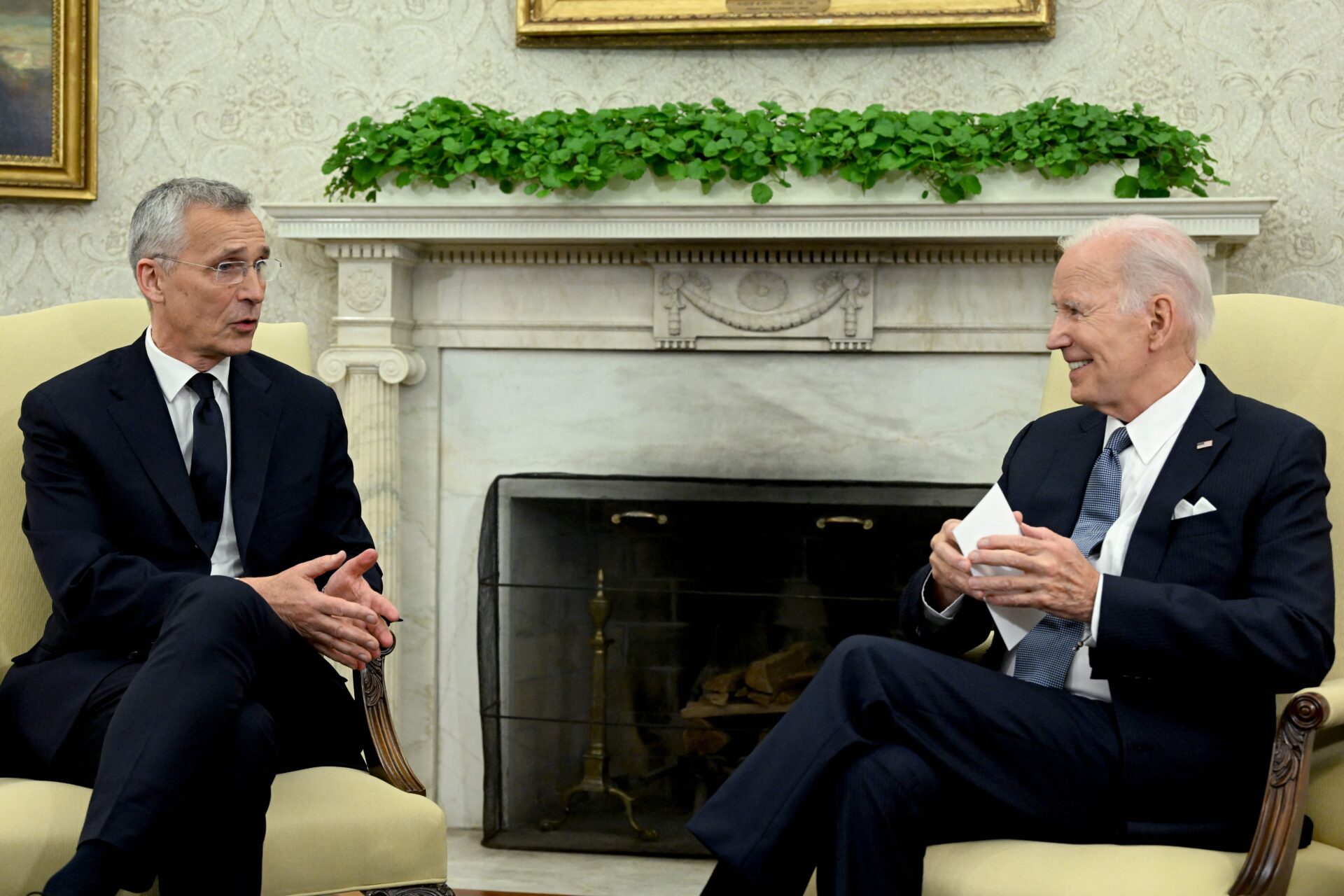Politics, Policy, Political News Top Stories
President Joe Biden met Tuesday with NATO Secretary General Jens Stoltenberg at the White House and reiterated that the alliance is united in defending Ukraine for as long as it takes to fight off Russian forces. But neither offered clarity about the unsettled question of who will lead the alliance after Stoltenberg departs later this year.
“We’ve strengthened NATO’s eastern flank, made it clear we’ll defend every inch of NATO territory. I say it again: The commitment of the United States to NATO’s Article 5 is rock solid,” Biden said, a reference to the charter’s fundamental provision under which an attack on one member nation is considered an attack against all.
The meeting, initially scheduled for Monday but then postponed following the president’s last-minute root canal, comes roughly a month ahead of NATO’s annual summit, which is being held in Vilnius, Lithuania. Ostensibly, it served as a routine visit to talk through the issues related to the ongoing war in Ukraine that are likely to dominate the July meetings. Before his meeting with Biden, Stoltenberg stood alongside Secretary of State Antony Blinken as he teased a “robust” new package of defense and political aid for Ukraine that would be unveiled at the Vilnius summit.
Blinken later announced a $325 million tranche, which includes more munitions for High Mobility Artillery Rocket Systems, anti-tank weapons, armored vehicles, artillery rounds and other equipment. “The United States is partnering with over 50 nations to lead efforts in support of Ukraine’s self-defense against Russian aggression,” Blinken said in a statement.
Later, after joining Biden in the Oval Office, Stoltenberg said that Ukrainian forces “are making progress” with their just launched counter-offensive. “The more land the Ukrainians are able to liberate, the stronger hand they will have at the negotiating table,” he said.
Stoltenberg emphasized the consistent and shared view within NATO that Russia’s 16-month-long war was a fight “against free people everywhere,” arguing that the repercussions of any victory for Moscow would be to make the world “more dangerous” by emboldening other countries “including China.”
The alliance, Stoltenberg said, will “agree to sustain and step up the support for Ukraine,” which includes a “stronger commitment to increase defense spending.” He also defended Europe’s contribution to Kyiv, and said “European allies are also doing their part, with tens of billions of economic military support.”
Those comments papered over somewhat the very real differences within NATO concerning the pace and nature of defense aid being delivered, Ukraine’s request for security guarantees against Russia and its bid for NATO membership. And they distracted from the matter of Stoltenberg’s eventual successor, which is becoming a major focus for the alliance behind the scenes.
In European capitals, where buzz is building around several successor candidates, officials have been anxiously awaiting some sort of signal from the White House about who Biden was likely to support. Known for being a slow and deliberate decision-maker, the president met last week with Danish Prime Minister Mette Frederiksen — who many European diplomats believe to be on a short list of potential secretary general candidates — and with British Prime Minister Rishi Sunak.
But Biden has offered few clues afterward about his thinking. After speaking to the press for only a few minutes each, neither he nor Stoltenberg responded to shouted questions as aides shuffled reporters out of the Oval Office.
During a press conference last Thursday with Sunak, he was about his thoughts on the prime minister’s preferred candidate, British Defense Minister Ben Wallace. Biden only offered he wasn’t ruling that possibility out, stating blandly that the decision requires a broader consensus that’s yet to come into focus.
Stoltenberg, who’s led NATO for nine years after extending his initial four-year term three times, appears set to return to his native Norway in October. The Ukraine war, which has unified the alliance
“I have no other plans than to end my tenure,” he said during an interview Monday with PBS NewsHour, saying he was “confident” that the group’s 31 members will eventually agree on a successor. “I think the good thing for everyone is now to have another person at the helm of the alliance.”
John Kirby, the spokesperson for the National Security Council, has also refused to provide any clarity about the president’s thinking on the matter. He demurred when asked Monday if Biden had any criteria for a new secretary general, such as the person being or having been a head of state or coming from a nation that’s already meeting the benchmark of spending 2 percent of its GDP on defense.
“It has to be somebody that the whole alliance can get behind and can be a transformative leader,” he said in response to multiple questions on the subject.
Under NATO’s charter, electing a secretary general requires the support of all 31 member nations. That’s no easy feat in a diverse alliance. And while the job is likely to go to a European, the U.S., given its outsized role in funding the organization and determining its course, has often had more sway when it comes to blessing a candidate and rallying other nations behind them.
Author Profile
- “Unrated” Bias Rating
- GrilloCOM Grab is an online bot. The bot extracts media from “YouTube” with topics relating to News, History, The USA, and more interesting information.
Latest entries
 VideoFebruary 23, 2024Has Dubai's Latest Megaproject Failed?
VideoFebruary 23, 2024Has Dubai's Latest Megaproject Failed? VideoFebruary 22, 2024Tom Scott – shadows
VideoFebruary 22, 2024Tom Scott – shadows VideoFebruary 22, 2024What if… [⚠️Creepy/Gore⚠️] HTTYD
VideoFebruary 22, 2024What if… [⚠️Creepy/Gore⚠️] HTTYD VideoFebruary 21, 2024трейлер
VideoFebruary 21, 2024трейлер

